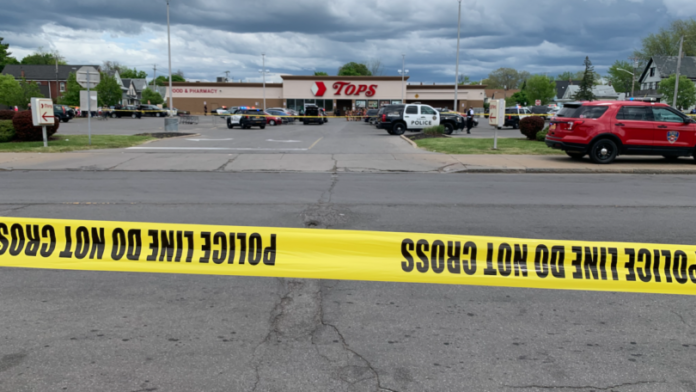
By Stacy M. Brown, NNPA Newswire Senior National Correspondent
As the nation commemorates the second anniversary of the heinous Buffalo mass shooting that claimed the lives of 10 Black individuals at a Tops supermarket, a painful reality emerges: hate crimes against Black communities continue unabated, casting a long shadow over efforts for justice and equality.
“It was a modern-day lynching,” Garnell Whitfield Jr., son of victim Ruth Whitfield, solemnly remarked about the May 14, 2022, hate-fueled massacre. “I’ll always carry the scar of 5/14 and what happened to my mother. So, I don’t expect to be healed,” Whitfield said during a televised interview. “I know that’s something everybody talks about. I think that’s kind of an unrealistic expectation.”
In addition to Ruth Whitfield, 86, the other victims were Roberta Drury, 32; retired Buffalo police officer Aaron Salter Jr., 55; Heyward Patterson, 67; Pearl Young, 77; Geraldine Talley, 62; Celestine Chaney, 65; Black Press journalist Katherine “Kat” Massey, 72; Margus Morrison, 52; and Andre Mackniel, 53.

The racist murders, which self-described white supremacist Payton Gendron carried out, shook the nation. Yet, despite pledges for change, the latest FBI data reveals a disturbing trend: between 2020 and 2022, Black individuals were targeted in over half of reported hate crimes nationwide.
The numbers are staggering. They show hate crimes against Black youth have seen a relentless rise, climbing steadily over the past three years. From the Dollar General store tragedy in Jacksonville to the Walmart shooting in Beavercreek, Ohio, the Black community remains under siege.
Researchers at ABC News said they analyzed the most recent FBI data which revealed that more than 8,500 hate crimes reported nationwide between 2020 and 2022. African Americans were targeted in 52.3% of the offenses. Between 2021 and 2022, the network reported that the numbers rose from 2,217 to 3,421, making Black people four times more likely to be targeted than the overall U.S. non-Hispanic Black population.
Hate crimes targeting Black people under the age of 18 rose 10% in 2020, 12% in 2021 and 14.6% in 2022, according to the data.
Further, the latest research from Columbia University highlighted the significant impact of structural racism on health outcomes, particularly mental health. Through the school’s Psychiatric Epidemiology Training (PET) Program, scholars revealed compelling evidence linking systemic racial biases to disparities in diagnoses, notably in conditions such as depression and schizophrenia.
The Columbia findings, under the direction of Professor Katherine Keyes, highlighted how structural racism permeates various facets of society, influencing access to healthcare services, environmental factors like housing and nutrition, and societal norms, all of which ultimately contribute to divergent health outcomes.
Additionally, legislative measures like the Emmett Till Antilynching Law were meant to stem the tide of racial violence. Yet, with no charges filed under the law to date, its effectiveness remains in question. Even as justice was served in the Ahmaud Arbery case, where perpetrators were convicted on state and federal hate crime charges, such victories are few and far between.
In Buffalo, efforts to bring the perpetrator to justice have been met with mixed results. Gendron, sentenced to life in prison for his crimes, awaits the federal death penalty. However, the indictment of social media companies for their role in radicalizing the gunman reveals a complex legal battleground where accountability is elusive.
The lawsuit, spearheaded by relatives of the victims, accuses social media platforms of facilitating Gendron’s descent into extremism. While companies like Twitch and Google deny these allegations, the battle for accountability wages on, amid growing concerns over online radicalization.
Initiatives, like the “Unity” monument that organizers planned to unveil at Tops Supermarket, have served to offer solace but do little to assuage the pain of loss. For Whitfield and others, the scars of May 14 will always run deep, a stark reminder that justice delayed is justice denied.
“So, 5/14 may be significant for some,” Whitfield reflects. “But it’s no more significant on 5/14 than it is on 5/13 or 5/12, or today. I have to live the rest of my life without my mother and with what happened to her.”

